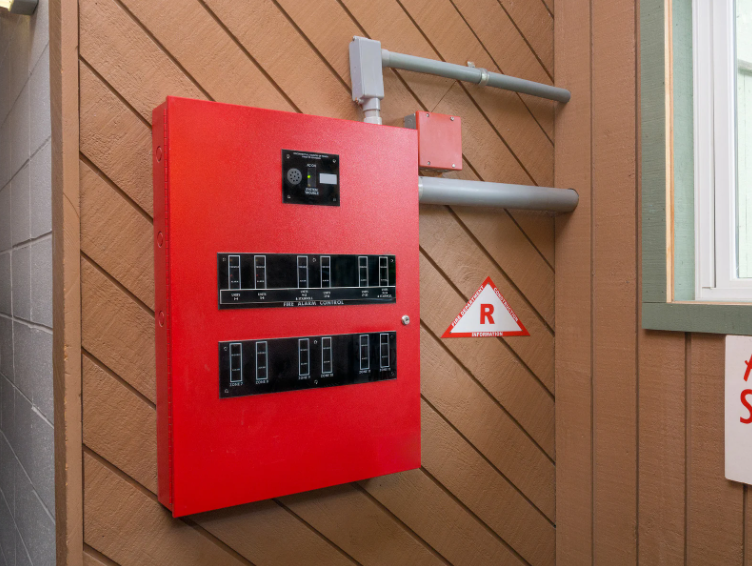Fire hazards pose a significant threat to homes, businesses, and public spaces. The best way to mitigate fire risks is through an efficient fire detection system, with the fire alarm panel serving as the central hub for fire safety. A fire alarm panel is designed to detect fires at an early stage, alerting occupants and emergency responders before the situation escalates. Understanding how a fire alarm panel functions, the different types available, and the benefits of installation can help individuals and businesses enhance their fire protection strategy.
What is a Fire Alarm Panel?
A fire alarm panel is a crucial component of any fire detection system. It acts as the brain of the entire setup, receiving signals from smoke detectors, heat sensors, and manual call points. Once a potential fire is detected, the fire alarm panel processes the data and activates alarms, sirens, and notification devices to warn occupants. The fire alarm panel also communicates with emergency services, ensuring a rapid response to fire incidents. Without a fire alarm panel, fire detection systems would lack the coordination required for efficient hazard management.
Types of Fire Alarm Panels
Conventional Fire Alarm Panels
A conventional fire alarm panel is commonly used in small buildings and residential settings. It divides the building into zones, allowing users to identify the general area of a fire. While cost-effective, a conventional fire alarm panel lacks precise pinpointing capabilities, making it less ideal for large structures.
Addressable Fire Alarm Panels
An addressable fire alarm panel offers more advanced functionality by assigning a unique address to each connected device. This means that in the event of a fire, the fire alarm panel can indicate the exact location of the threat. Addressable fire alarm panels are widely used in commercial and industrial buildings where precise fire detection is essential.
Wireless Fire Alarm Panels
A wireless fire alarm panel eliminates the need for extensive wiring, making it a convenient option for buildings where traditional installation is challenging. Wireless fire alarm panels offer flexibility and scalability, allowing easy integration of additional sensors and alarms.
Hybrid Fire Alarm Panels
A hybrid fire alarm panel combines wired and wireless technology, offering the advantages of both systems. Businesses that require a balance of reliability and adaptability often choose a hybrid fire alarm panel for their fire detection needs.
How Fire Alarm Panels Detect and Respond to Fire Hazards
A fire alarm panel relies on a network of smoke detectors, heat sensors, and manual call points to detect fire hazards. Once a device identifies smoke or excessive heat, it sends a signal to the fire alarm panel, which processes the information and triggers alarms. Modern fire alarm panels can also notify emergency services automatically, ensuring a swift response. The ability of a fire alarm panel to quickly process and transmit data can mean the difference between minor damage and catastrophic loss.
Key Features to Look for in a Fire Alarm Panel
When selecting a fire alarm panel, several features should be considered to ensure optimal performance. The reliability of the fire alarm panel is paramount, as a delayed or faulty response can have severe consequences. Compatibility with various detectors and alarms ensures seamless integration, while expandability allows businesses to scale their fire detection system as needed. Additionally, modern fire alarm panels offer smart integration, connecting with building automation systems for enhanced safety.
The Importance of Regular Maintenance and Testing
Regular maintenance is essential to ensure a fire alarm panel functions correctly. Routine testing helps identify potential issues before they compromise safety. A fire alarm panel should be inspected periodically to check for wiring issues, battery life, and sensor functionality. Failing to maintain a fire alarm panel can result in undetected fire hazards, putting lives and property at risk.
Benefits of Installing a Fire Alarm Panel
A fire alarm panel provides numerous benefits, including early fire detection and reduced property damage. With a well-maintained fire alarm panel, occupants receive timely alerts, allowing them to evacuate safely. Many insurance providers require businesses to have a fire alarm panel to comply with fire safety regulations. Investing in a high-quality fire alarm panel enhances overall security and peace of mind.
Choosing the Right Fire Alarm Panel for Your Needs
Selecting the right fire alarm panel depends on several factors, including building size, budget, and regulatory compliance. A small office may benefit from a conventional fire alarm panel, while a high-rise building would require an addressable system. Comparing different brands and models can help identify the most suitable fire alarm panel. While some businesses opt for DIY installation, professional installation ensures that the fire alarm panel meets safety standards and operates correctly.
Common Myths and Misconceptions About Fire Alarm Panels
Many misconceptions exist about fire alarm panels, leading some to underestimate their importance. One common myth is that a fire alarm panel is only necessary for large buildings. In reality, even small properties benefit from fire detection systems. Another misconception is that installing a fire alarm panel is too expensive. However, the cost of fire damage far outweighs the investment in a reliable fire alarm panel. Lastly, some believe that all fire alarm panels work the same way, but different systems offer varying levels of protection and features.
Takeaway
A fire alarm panel is an essential component of any fire safety system, offering early detection, rapid response, and improved emergency preparedness. Whether for homes, offices, or large industrial complexes, installing a fire alarm panel enhances overall fire protection. By choosing the right fire alarm panel, performing regular maintenance, and staying informed about fire safety, individuals and businesses can reduce fire hazards and safeguard lives and property. To ensure optimal protection, consulting with fire safety experts and investing in a high-quality fire alarm panel is the best course of action.











